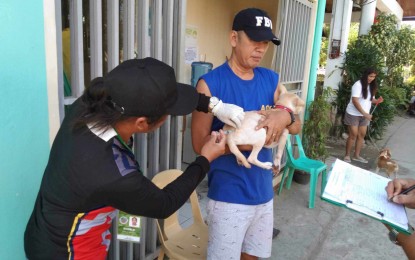
FIGHT VS. RABIES. A vaccinator hired by the municipality of Boac going "house to house" to administer free rabies vaccines to pet dogs and cats in this undated photo. The province of Marinduque is currently battling an unprecedented rabies outbreak. (Photo courtesy of Luna Eulogio Manrique)
BOAC, Marinduque – The provincial veterinarian here is urging pet owners to voluntarily submit their unvaccinated dogs for anti-rabies shots currently being offered for free by their local government units (LGUs) amid the unabated spread of the rabies virus among this island’s large canine population.
In an interview on Tuesday, Dr. Josue Victoria, who heads the Provincial Veterinary Office (PVO), said about 50 to 55 percent of the province’s dog population, estimated to number around 65,000 animals, have received their inoculation shots.
He refused to give an estimate as to how many rabid dogs are on the loose in Marinduque, explaining it is impossible to test for rabies until the dogs manifest symptoms of the disease, upon which it is likely to die within a few days.
Victoria said the island province’s dog population exploded during the pandemic when many local residents stopped restraining their pets and instead, allowed them to roam free around their neighborhoods.
“Sometime in 2022, we noticed the initial signs of a rabies outbreak. We tried to do early interventions but some of our efforts were not welcomed by animal advocates,” he told the Philippine News Agency in Filipino.
Victoria said his office launched a “selective culling” operation early on but this initiative had to stop because they were sued by an animal rights group.
He said the ongoing rabies outbreak has so far resulted in the deaths of two people.
In March, a 56-year-old male became rabid and died after he was bitten by an infected dog but opted to be treated by an “albularyo” (faith healer) instead of getting his anti-rabies shots.
In September 2023, a 16-year-old boy became rabid and died not long after being bitten by a dog.
Victoria said the provincial government has purchased some 5,000 doses of rabies vaccines for humans in anticipation of more animal bite victims.
He said there have been isolated cases of rabid dogs attacking hogs inside their pens and cattle on leashes, noting such incidents are rare and often result in the quick demise of the infected animals.
“In such cases, we observed that the infected farm animals often die within one day after manifesting symptoms,” he added.
Victoria said completely eradicating rabies in Marinduque may take another two years, but his office is trying to speed up the process with the public’s cooperation.
“Be responsible pet owners. Have your dogs vaccinated. It’s free… you don’t have to worry about the cost. And don’t allow your dogs to roam free,” he told Marinduqueños.
The PVO aims to achieve an 80-percent vaccination rate among Marinduque's dog population to establish a “protected population.”
Meanwhile, Luna Eulogio Manrique, head of the Municipal Disaster Risk Reduction and Management Office (MDRRMO) at the provincial capital of Boac, admitted that the rabies outbreak originated within their jurisdiction.
However, as of this writing, some 90 percent of dogs in Boac have already been vaccinated, he said.
Manrique called on the public to shun traditional healers who perform dubious “Tandok” rituals on bite victims, telling them to instead proceed directly to the nearest health center where there are ample rabies vaccines waiting for them.
Presently, there are known rabies cases in the towns of Boac, Buenavitsa, Gasan and Mogpog. (PNA)
